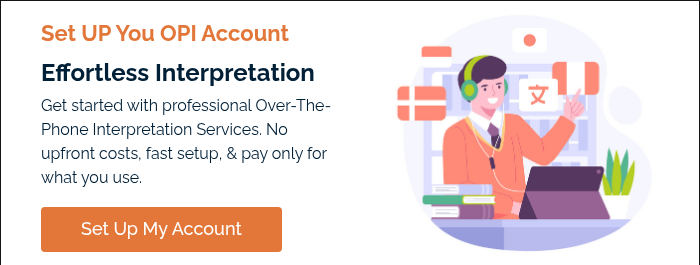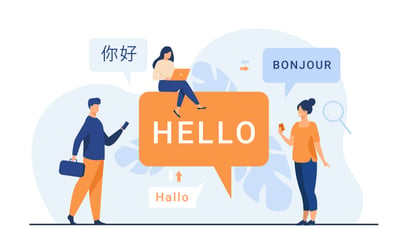
Over-the-Phone Interpretation (OPI) can be a crucial element for businesses needing to talk to clients or suppliers in new territories with different language requirements. Or, on a personal level, for individuals who don’t speak English and need legal, medical, financial, or other advice.
At first glance, it appears to offer a miraculous solution to interpretation. With a simple phone call and a few numbers, you can effectively communicate in almost any language, anytime, anywhere. However, does it cater to everyone's needs?
Don’t get us wrong, as a Language Services Provider (LSP)ourselves, we work with clients daily who need our OPI services, so we know what a valuable tool it can be. However, it isn’t suitable for every interpretation situation.
If this seems confusing, don’t worry; in this article, we’ll set out the pros and cons of OPI so that you’ll better understand whether it’s the right solution for your interpretation needs.
Pros of Over-the-Phone Interpretation
Language
OPI puts the vast majority of the world’s languages at your fingertips. Sure, Spanish, French, German, Italian, Portuguese, and all the usual suspects are easy to get an interpreter for. But what if you needed someone to translate your English into Hungarian? Hungarian, with its complex web of grammar rules, is one of the most difficult languages to translate, and finding an in-person interpreter, especially on short notice, isn’t easy.
OPI gives you access to almost all languages (at LinguaLinx, we work in over 99% of the world’s languages), providing a one-stop-shop approach to interpretation.
Location
Regardless of the language, whether it’s a common one or a rare one, if you’re not somewhere where you can find a Korean-speaking interpreter, and you need to speak to someone in Korean, you’re at a dead end.
With OPI, your location becomes irrelevant. As long as you have access to a phone, your LSP can get you the interpreter you need.
Confidentiality
You might be in a situation where the fewer people there are in the room, the better. It could be a legal case that covers very sensitive or painful issues for the person being interpreted. There may be reasons why as few people as possible can come into contact with them.
For any such interpretation that needs this kind of discretion, or legal protection, the anonymity of OPI works well.
Immediacy
Your LSP will have a roster of OPI interpreters who are available 24/7, 365 days a year. If you can’t wait for interpretation, OPI is the answer.
For example, suppose you’re running the A&E department of a busy hospital in a cosmopolitan city that’s a tourist hotspot. In that case, you’re going to get people in immediate need who speak a variety of languages, so you need to understand their needs and medical history quickly.
OPI allows you to be connected to the right interpreter within minutes.
Budget
In-person interpretation, obviously, requires a person to be present to do the interpretation. Getting people to locations always comes with a cost. Mileage, train and plane tickets, subsistence costs, accommodation where necessary, and other out-of-pocket expenses all can add up.
OPI, on the other hand, has none of these costs. You pay a small amount for the service and then only for the interpreter’s time. Chances are, if OPI is the right solution, you’ll spend less than an in-person interpreter.
So with all that in mind, OPI has to be the right solution for most interpretation needs, right
Cons of Over-the-Phone Interpretation
Large Numbers Of People
You’re in a board room with ten other people, five of whom are your new clients who only speak Russian. This is a lot of people to manage at the best of times; throw in interpretation, and this meeting could take five times longer than it should, or worse yet, grind to a halt.
An OPI interpreter isn’t going to be able to read the room and get a feeling for how the meeting is going and who needs to speak next. Really, you need someone physically there who can pick up on the atmosphere of the room as a whole and be cognisant when an order of speaking begins to happen.
Body Language
Albert Mehrabian, the well-respected researcher of body language, famously concluded that 55% of communication is nonverbal, 38% vocal, and only 7% comes from the actual words spoken.
Other studies have taken that 55% and put it somewhere near 70%.
Either way, there’s no doubt that the majority of how we communicate comes from our body language. Unfortunately, with OPI, body language is taken out of the equation.
Respect
Sometimes it’s just right to have an interpreter in the room with you. It can come down to a show of respect.
That you consider the event, and those in attendance, to be important enough that you want to overtly display your commitment to the business relationship.
Deaf Or Hard Of Hearing
When you need to interpret for someone who is hard of hearing or deaf, it goes without saying that OPI isn’t going to do the job. The visual element of interpreting, through the use of sign language, is a must-have in these situations.
There is another option to the in-person interpreter, though, and that’s Video Remote Interpretation (VRI). This is similar to OPI, but the interpreter can be seen so they could translate from native to target language using sign language.
Plan And Don’t Do It Alone
Those are the main pros and cons of OPI. Looking at whatever your needs are as a whole will help you come to the right decision. Where does the balance lie? More pros than cons for your situation, or vice versa?
One thing we’d always suggest is to try and see the need coming. Plan for it so that you’re ready when the time comes, and your LSP is poised to help you.
If you talk things through with them, they might even see challenges or solutions that you hadn’t considered. They do live and breathe it every day, after all.
Get A Quote For Your Interpreting Needs
In this article, we’ve covered the pros and cons of Over-the-Phone Interpretation (OPI) to help you decide when it’s the right choice.
OPI offers flexibility, privacy, and cost savings, but it may not be the best fit for large meetings, situations where body language matters, or when working with people who are deaf or hard of hearing. The best solution depends on your unique situation, and planning ahead is key.
At LinguaLinx, we can help you make the right decision. With ISO 17100 and ISO 9001 certifications and 20 years of experience, we’re experts in providing top-quality interpreting services. Whether you need OPI, in-person, or Video Remote Interpretation (VRI), we ensure your message is clear and accurate.
Contact us for a free, no-obligation consultation. We’ll help you find the right interpreting solution so you can communicate effectively, every time.






